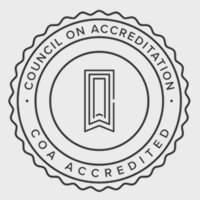For centuries, music has been used to connect, communicate, and aid in healing. Greek philosophers such as Aristotle and Plato believed that music could alter the mental, emotional, and physical state of humans. It was not until the 18th and 19th centuries that research on the use of music as a therapeutic tool was formulated. Since then, music therapy has evolved in to a researched-based profession practiced by over 8,000 credentialed music therapists worldwide.
Music therapy can be generally defined as; the use of music by a trained professional within a therapeutic relationship to meet one or more goals. Music therapists often use music and their relationship with a client to work towards changing behavior, mental health, communication, motor function, sensory processing, pain management, milestone development, and more. Music therapy is an individualized process. For example, some clients may work on improving their attention skills through focusing on specific elements of music such as volume, tempo, or lyrics. Other clients may use instrument play as a means to improve motor function or flexibility. The scenarios are different, but they both include a music therapist working through the many facets of music and with the client to achieve a specific goal.

When sharing with others that I am a music therapist, I am often met with recognition of how music can change the way we think, act, and feel. Many people easily identify the positive attributes of music, but what truly defines music therapy is not the music itself. It is instead the intentional use of music by a music therapist within a clinical relationship. In many settings, music is used to relax, connect, and entertain people. A high school student playing the piano at a nursing home is probably beneficial and enjoyable to the residents, and may help them become more alert to their current surroundings. A music therapist, however, might choose specific music for a purpose, and integrate conversation, movement, and instrument play to target various goals such as reminiscence. A nurse in a hospital playing recordings of a patient’s favorite music may boost mood, and perhaps take the patient’s mind off the pain they are experiencing. A music therapist can take the interaction to the next level and would have the ability to validate the patient’s current mental, emotional and physical state, and use music making, listening, or writing to guide them to a desired state.
I could not agree more with a quote from musician Ray Charles, “Music is powerful. As people listen to it, they can be affected. They respond.” Moreover, I could not be more grateful that the work I am privileged to do helps people listen and respond to music as they grow and heal.
Copyright (2021) Written by Bailey (Condon) Skarpness, Music Therapist, MT-BC
Bailey is a board certified music therapist at Tanager Place. Bailey is a 2019 graduate of Wartburg, and received a Bachelor’s degree in Music Therapy and Music Education. Bailey then went on to intern at Higher Octave Healing in Tempe, AZ where she worked with people aged 2-100 with various developmental and intellectual disabilities. Bailey started work as a music therapist at Tanager Place in February 2020 where she has since worked with the autism social skills program, inpatient ICF/ID and PMIC programs, the LGBTQ Youth Center, and as an outpatient therapist at the Tanager Place Clinic.


